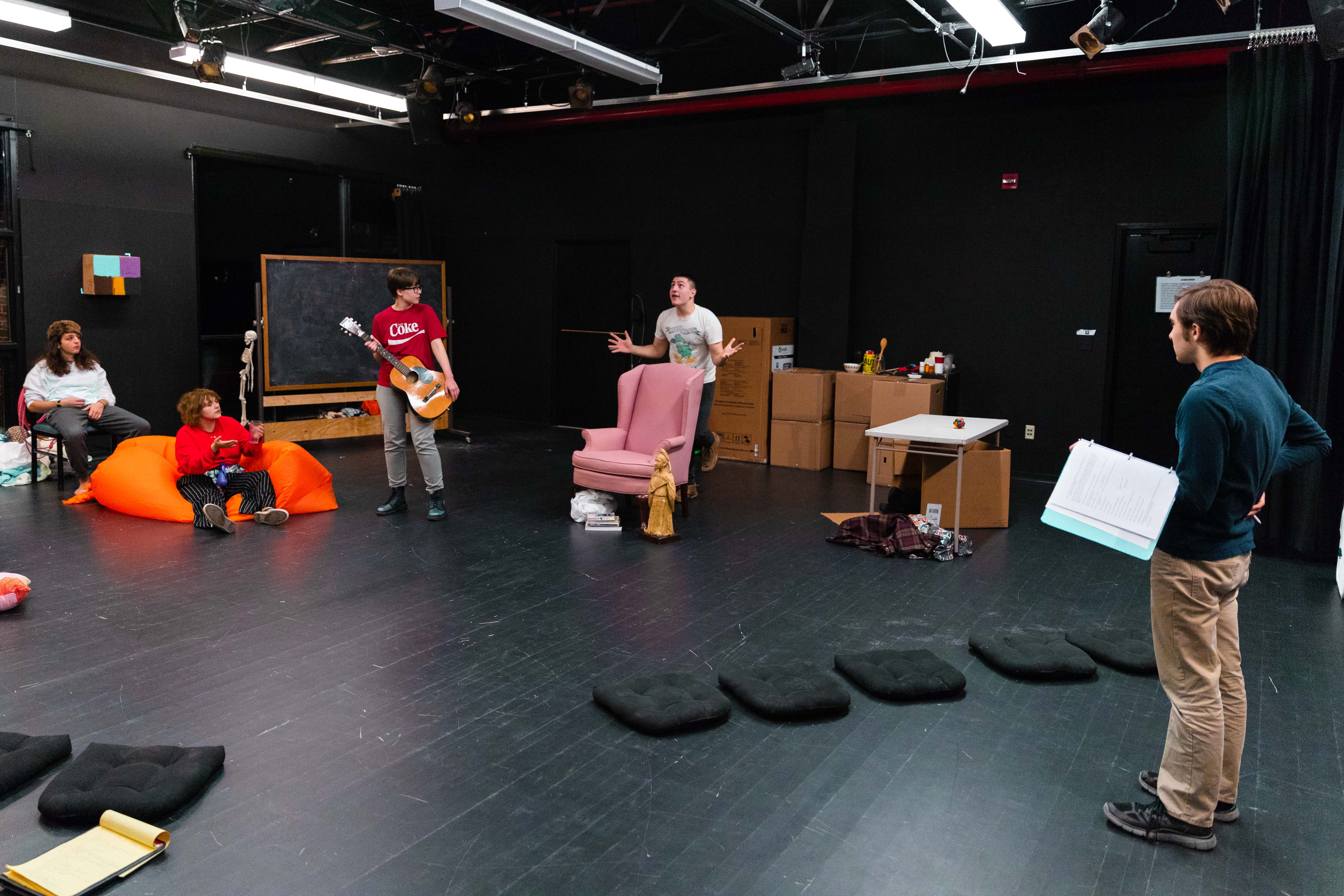By Em Miller

Photo: Dante Haughton
Our final studio lab of the semester is Hir by Taylor Mac, directed by Philip Merrick ’19. The play is a complicated and sometimes surprising piece of theater, so I sat down with the dramaturge, August Sylvester ‘20, to discuss their perspective on it.
EM: What is Hir by Taylor Mac? What’s it about?
AS: It’s about a family and their struggle to live together, them trying to heal in a lot of ways, and their relationships—it is a family drama in that sense. It is really just about the relationships between the characters. Through those, it also has implications about larger, society-wide themes. For instance, there definitely is a sense of it being about gender, whatever that means, although I don’t think it’s about gender in a “it’s about gender!” way. I think it’s about the way that the different characters exhibit gender and deal with gender. I also like Philip’s idea that it’s a coming out play, and that it’s about coming out, and the conversations that ensue from coming out.
EM: In the pre-show presentation, you all spent some time talking about how all the characters in this drama are contemporary archetypes. Can you elaborate on that?
AS: Each of the characters definitely exists as some stereotyped version of themselves. Paige is very much the excitable mom to a trans person, very into her child’s transition, and reworks her entire world around these ideas about gender that she never thought about before a little bit ago. Arnold (the father) is the “traditional man.” We don’t see him like that a lot because he’s had a stroke before the events of the play, but he represents the patriarchal ideal and everything that comes along with that. I think Isaac (the older brother) is your average late teens or early twenties guy, who’s grown up in a traditional family, and is being exposed for the first time to a lot of things that he hasn’t been around in the past, when he comes back from the war to his family. And Max (the younger child) is, you know, classic angsty teen—classic trans angsty teen, because there are a lot of things that ze says that a cis angsty teen wouldn’t say. However, they’re all not fully two-dimensional, as per the direction we’re going with absurd realism, which is the play’s style as indicated in the script. The most important thing for that idea is that it has these characters who are ultimately real, with real emotions, but are bent and distorted into these stock characters, and do these absurd things to each other. Each of them still has a moment where they come back, and become very three-dimensional.
EM: As a play with a prominent trans character, what can this play mean for the Skidmore Theater Department?
AS: Well, this play isn’t a “gender play.” It’s about gender in a broad sense, and it happens to have a trans character in it, which is what makes a lot of the play tick, but this is not a play that exists for the sake of its trans character, in any way. This play is an exploration, and Max is integral to that exploration, but it doesn’t exist just for the sake of hir.
EM: I feel like that comes back to the question of whether plays, and art in general, about marginalized people (i.e. women, people of color, trans people) and their experiences should be educational, versus being an expression or exploration of those themes and experiences.
AS: Oh yeah, this play is not educational. It kind of slaps you in the face if you try and take anything as a teaching moment. It very much is a play that is not there to educate you and really just does not care if you miss things about it. Taylor Mac is a person who relishes in making you uncomfortable if you don’t have the understanding and the background to “get” all of it. I think that’s a big part of judy’s approach to theater in general: if you don’t enjoy this, you’re going to be very uncomfortable and you’re going to have to deal with it. Congratulations! Have fun!
Hir runs December 3rd-5th at 7pm each night in Studio A. Admission is free! Email labtickets@skidmore.edu to confirm your attendance.
Content Warning: This play contains homophobic and transphobic language, themes of domestic abuse, and mentions of sexual assault and suicide.
*
Em Miller is a junior and staff writer for STLN
